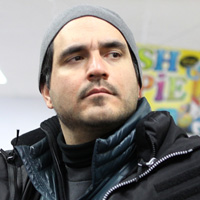Cannibal spoof takes bite of Big Apple
Sometimes, hard work pays off. At the TriBeCa film festival last April, Montreal filmmaker Boris Rodriguez, BFA (cinema) 91, celebrated his 40th birthday with a packed screening of his debut feature, Eddie the Sleepwalking Cannibal.

"I had 60 friends and family come to the premiere; people came in from Chicago, Mexico City, Toronto, Montreal," says a still-incredulous Rodriguez, who studied at Concordia’s Mel Hoppenheim School of Cinema.
"My worst fear about this film was that it would be a complete piece of crap after six years,” adds Rodriguez, over dessert and coffee at a Manhattan hotel bar. “I never expected a New York premiere with glowing reviews in Indiewire and the Village Voice."
The New York Times, Complex magazine and Screendaily.com also raved about this dark, wacky horror-comedy, starring Danish actor Thure Lindhardt. Eddie the Sleepwalking Cannibal follows the friendship between Lars, a painter who flees post-fame burnout to teach art in the Canadian North, and Eddie, mild-mannered giant by day; sleepwalking cannibal by night.
Though he maintains both directing and screenwriting credits, Rodriguez explained that Los Angeles-based writer John Reynolds came up with the story. "It was originally a werewolf and the painter was a novelist and it took place on the outer banks of North Carolina," Rodriguez says. "He eventually moved to L.A. and I came to Canada, so [when I rewrote] the werewolf became a cannibal and sand dunes became snow."
Yet the essence of the story remained the same. As Eddie becomes Lars's unlikely muse, the flick explores the theme of suffering for one's art. Rodriguez -- who remains "hands on" on all elements of his films -- can relate.
"I saw something autobiographical in it," he says. "The destructive effect the creative process can have: how far will you go for your art?"

For Rodriguez, the answer to that question is, pretty far. "You sacrifice stability, you sacrifice relationships, you sacrifice heath in some cases," he says of his passion for filmmaking. "I'm more careful about it now, I can see the warning signs, but in the past I've sputtered out. The good thing about that is that you know exactly what your limit is. If you feel it coming, you can avoid it as opposed to fearing it."
Born and raised in Montreal by a Cuban father and Mexican mother, Rodriguez’s directorial debut was the award-winning documentary Havana Kids (1996). "Documentaries are really difficult to deal with emotionally," he recalls. "I wasn't trained to be a journalist; to have that distance. Also, it was a really difficult time in Cuba. It was very hard, people were riding around on bicycles and losing weight because there wasn't enough food."
The success of Havana Kids led him to the Canadian Film Centre in Toronto, where he continued to train as a director before landing a stable directing gig at TVOntario. More acclaimed films followed, including Beso Nocturno (2000) and Perfect (2003).
He's worked hard, been lucky and is infused with "dogged persistence," though he's not quite sure if the latter is a "quality or a defect."
"Tenacity, courage and persistence gets you to a certain point," he says. "After that, it's just pure desperation. You've gone too far to go back so you have to go all the way. There's no heroics in that part, that's just survival. If you pull out then you've lost all you've worked for and you start from zero."
So was he nervous at the big Tribeca Film Festival premiere for Eddie the Sleepwalking Cannibal? "Big time! Once I was in front of the crowd after the movie, I didn't even know if the crowd had liked it. But you get to a point where you're so scared you kind of break a barrier, so I became super comfortable in front of all those people, cracking jokes. Either I passed out and went into convulsions because I was so nervous or I just let go and became myself."
Related links